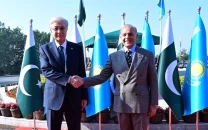The securitisation of development in Pakistan
Development in Pakistan has become a means to overcome global security concerns rather than an end in and of itself.

The securitisation of development in Pakistan
However, at the crux of the argument for promoting development in the country is that a stable Pakistan will also serve the security interests of the US. The report states that, “insecurity in Pakistan is a critical threat to the safety and security of Americans and the stability of South Asia as a whole” which is why development in Pakistan should and does matter to the US.
One often sees this connection between development and security since the declaration of the US-led war on terror. The US is not alone in its position of increasingly linking international development policy with security concerns — this change in the approach to development has come about in multilateral development organisations as well as bilateral donors. They attempt to address security threats from developing/failing states to the developed world via development assistance. But this interdependence between security and development concerns presents new challenges for international development and can have negative ramifications for the developing world.
The development-security nexus holds legitimacy to the extent that there are some arguments in the international arena that support the claim that chronic poverty causes chronic conflict and vice versa. Recognition of this link has led to much debate on the importance of security in development. Two positions have emerged prominently in this debate.
The first of these is the ‘human security agenda’ which is concerned with the security of people in conflict prone areas in the developing world. The argument is that reducing poverty will lead to a fall in conflict and terrorism. However, there are no obvious links between poverty and terrorism. The poverty-conflict spiral is too simplistic and undermines the human security agenda because it does not take into consideration a more nuanced understanding of the grievances that cause conflict. For instance, the violent revolt and conflict in Balochistan, in Pakistan’s southwest, is not just a result of the crippling poverty in the province but is also, among other things, driven by complex political power struggles and issues of frustration along ethnic lines. Therefore, the entire premise that enhancing security depends on just development and poverty reduction is weak.
The second position, which I feel is more problematic, is the securitisation of development — that is, concerns of the developed world of security threats to them due to underdevelopment in the developing world. Failed or failing states, like Pakistan, have become a policy concern for the US. Seen as the breeding ground for terrorism, Pakistan is seen as a threat not only to itself but also the US and the entire global world. Development in Pakistan, therefore, has become a means to overcome global security concerns rather than an end in and of itself. Such an interlinking of security and development has serious detrimental effects on the development trajectory of Pakistan.
This is precisely one of the problems that the report “Beyond Bullets and Bombs” identifies with the US development mission in Pakistan. It states that one of the reasons why development initiatives by the US in Pakistan are failing is that “the integrated ‘AfPak’ approach has muddled the development mission in Pakistan”. The AfPak approach merges development efforts for Afghanistan and Pakistan with broader diplomatic and defence policies. This entanglement of security and development policies has led to a myriad of obstacles for the development programme in Pakistan.
For one, the giving of aid is determined by US objectives in fighting the war on terror and not according to the development needs of Pakistan itself. The report states: “Integration has made long-term development issues in Pakistan more susceptible to distraction by the security and diplomatic emergencies of the moment. For instance, in the aftermath of the Raymond Davis incident in Lahore, the US government cancelled plans for a trilateral economic summit, and the press reported widespread rumours that a congressional delegation visiting Pakistan threatened to cut US aid.”
When security concerns of the US start dictating the delivery of development assistance to such an extent, poverty reduction measures can be undermined and the overall goal of human development can become obscure.
Linking development and security can also be a recipe for confusion and incoherence because it seeks to situate military, political and development aid projects as part of the same overall goal and in doing so sidelines constructive development in Pakistan.
The US development programme in Pakistan is aiming to do too much under the mandate of development, which ends up politicising development initiatives. Thus, the development programme is no longer perceived as being independent and neutral by the Pakistani public at large.
Although the report identifies the “securitisation of development” to be one of the major hindrances to the success of the US aid and development mission in Pakistan, making the pertinent suggestion that the Pakistan development mission needs to be separated from the security programme, I think it falls into the trap of securitising development itself.
The study group that put this report together claims that long-term development in Pakistan is pertinent for the US because it would serve their security interests. Development in Pakistan, therefore, is not seen as an end in itself and starts to be overtaken by security related instrumental calculations. Currently, the very goals that international development measures intend to achieve, such as poverty reduction and human rights, are being compromised in the name of development in Pakistan. I believe it is imperative that the development paradigm in Pakistan be kept separate from US security concerns. Otherwise, the pursuit of development and betterment of humanity in the country is under threat.
Published in The Express Tribune, August 5th, 2011.



















COMMENTS
Comments are moderated and generally will be posted if they are on-topic and not abusive.
For more information, please see our Comments FAQ